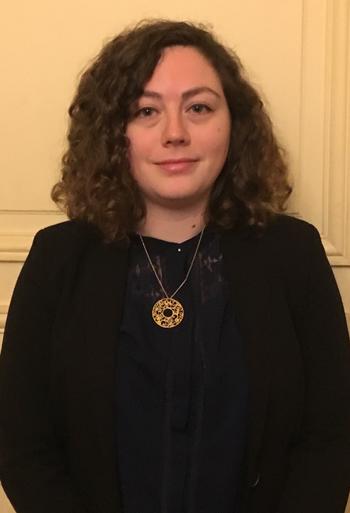Pharmacist Alix Démaris

Institute of Pharmacy
Clinical Pharmacy & Biochemistry
Freie Universität Berlin
12169 Berlin
Curriculum Vitae
|
2019-Present |
Doctoral student at the Graduate Research Training Program “PharMetrX: Pharmacometrics & Computational Disease Modelling“ at the Dept. of Clinical Pharmacy & Biochemistry supervised by Prof. Dr. Charlotte Kloft at the Freie Universitaet Berlin |
|
2018 6 months |
Sanofi-Aventis R&D, Alfortville, France Modeling and Simulation - Pharmacometrics internship - PopPK modeling of an ADC in early development and optimal design for a phase III trial - PopPK modeling of a mAb and determination of the active dose for children using allometric methods |
|
2017-2018 |
Paris Descartes and Paris Diderot Universities, Master 2 “Methods for therapeutic evaluation” - Statistical modeling for therapeutics evaluation - Longitudinal data – NLME models - Advanced statistics and Survival Analysis |
|
2017 6 months
|
Sanofi-Aventis R&D, Montpellier, France PBPK modelling internship - PBPK modeling in order to study the effect of polymorphism and DDI on drug exposure in healthy volunteers and pregnant women - Bibliographic review on pregnant women’s physiology and fetal physiology. |
|
2016-2017 |
Paris Descartes University, France Master 2 « Pharmacokinetics » - PBPK, PKPD and PopPK modeling - Non-Compartmental Analysis - Statistics |
|
2012-2017
|
Paris Descartes University, France College of Pharmacy Specialization in pharmacokinetics, Pharmaceutical Industry |
|
2015-2016 6 months
|
Hospital Beaujon, Clichy, France Hospital Bichat, Saint-Ouen, France Pharmcology ward and modelling unit UMR1137 Inserm – Internship : - PopPK modeling (Monolixâ) for the estimation of the tacrolimus exposure in liver-transplanted patients in the early stage of their treatment. - Data collecting for liver transplanted patients and Data processing |
|
2015-2016 (6 months)
|
Hospital Beaujon, Clichy, France Surgery and Hepatology Intensive Care Unit (3 months) and Hepatology ward (3 months) – Externship : - Pharmacokinetic study of tacrolimus - Daily follow up of liver transplanted patients |
|
2015 (2 months) |
Hospital Cochin Center, Paris, France Pharmacology-Toxicology ward - Research internship in pharmacokinetics : - Pharmacokinetic study and analytic assay of metformin - Epidemiologic study of metformin intoxication |
|
2013-2015 |
Paris Descartes University, France Master 1 « Physiology, Pharmacology, Toxicology » |
|
2010-2012 |
Paris Descartes University, France Competitive entrance exam of medical studies |
“Optimising monoclonal antibodies therapy in inflammatory bowel diseases”
Inflammatory bowel diseases (IBD) are a group of chronic inflammatory disorders that affect the gastrointestinal tract. There are two main forms of the disease, Crohn’s disease (CD) and ulcerative colitis (UC), which primarily differ in symptoms and location of the inflammation. In the gastrointestinal tract of the patients with IBD increased cytokine expression (e.g., tumour necrosis factor alpha, TNFα) and an elevated number of immune cells are present. The symptoms that patients most often experience include diarrhoea, abdominal pain, malnutrition and fatigue.
Immunosuppressive and anti-inflammatory agents are used as standard treatment for IBD. However, in many patients the response to this treatment is absent or fades over time. Therefore, monoclonal antibodies (mAbs) can also be employed for IBD therapy. These antibodies are therapeutic proteins that bind with high specificity to their targets. Together with long half-lives, this characteristic makes them promising pharmaceuticals. The most widely used biologics in IBD are the TNFα inhibitors such as adalimumab, certolizumab, golimumab and infliximab, which are highly effective in the treatment of both UC and CD.
My research work will be focused on these therapies and the exploration of the loss of response associated with them. Loss of response to mAb therapy may be attributed to suboptimal drug exposure which in turn may be caused by the formation of antidrug antibodies. Moreover, response to therapy is highly variable between individuals. An optimal dosing strategy may reduce the development of loss of response in an individual and improve mAbs therapy for IBD patients. Further studies are needed in order to complete the knowledge in this area and support and improve optimal dosing strategies with mAbs in IBD patients.
One way to assess dosing strategies is pharmacokinetic (PK) and pharmacodynamic (PD) analysis of these mAbs. With this method, dosing strategy can be evaluated including its impact on exposure (PK) and response (PD). In my research work, two modelling approaches will be used for analysis of PK/PD data: Nonlinear mixed-effect (NLME) modelling and pharmacologically based pharmacokinetic (PBPK) modelling.
NLME modelling (also called population PK modelling) is a powerful approach for analysis of sparse clinical data, which is usually the case for mAbs related data. Moreover, these models can also quantify the interindividual and intraindividual variability in a population and enable evaluation of the influence of patient-, disease- and therapy-specific characteristics (covariates) on the PK, PD and disease progression. These covariates may explain part of the quantified variability and help to better understand the response variability to the treatment which is usually very high with mAbs.
PBPK modelling can also be used for analysis of PK and PD data. Those models are more mechanistic and allow the description of the drug´s PK/PD by taking into account different physiological and biological processes. PBPK/PD modelling can also be used to study special populations such as pregnant women in whom physiological changes occur over time.
NLME modelling and PBPK/PD modelling each bring its own set of information and can be built from different data sources. These approaches can thus be used complementarily to better understand the PK and PD of mAbs.
The focus of my research will be on the optimisation of mAbs therapy for IBD patients and pregnant women with IBD. My project will consist of characterisation of PK/PD of mAbs used in IBD using different modelling approached (i.e. population and PBPK modelling), including assessing the impacts of covariates and investigating special patient populations (i.e. pregnant IBD patients).